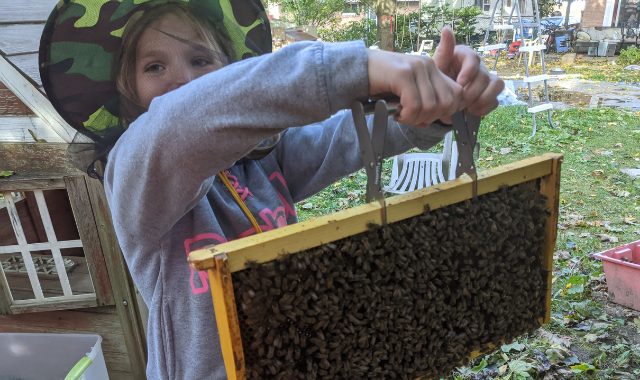Since yesterday was sunny and about as warm as it’s going to get for a bit, Brynnley and I decided to check out how the bees were doing. Christina stayed inside, because she had gotten stung again, this time in the face, causing a lot of swelling, to the point that she couldn’t open one eye. How did she get stung? She was rescuing bees and put her head a bit too close to the hive entrance. They don’t like that.
So, Brynnley and I got the smoker going, pulled off the cover, vivaldi box (helps with moisture in the winter), three supers just full of honey (about 40lbs each now!), and checked on how the brood box was going at the bottom.
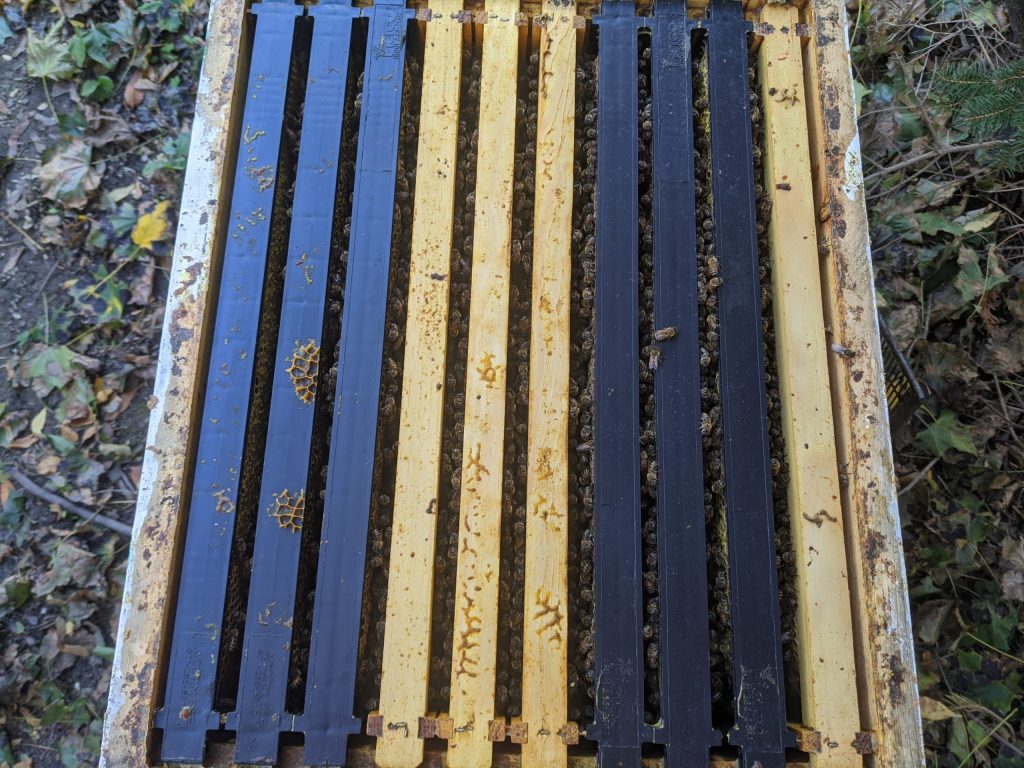
First thing we noticed was there are a ton of bees still! From what I understand, most colonies slow down by the time fall comes around. Ours doesn’t seem to be yet. I picked up the vivaldi box, and it rained bees as I was moving it out of the way. I had to be careful where I stepped after that.
Lots of bees in the supers as well, and then when we got down to the brood chamber, even more.
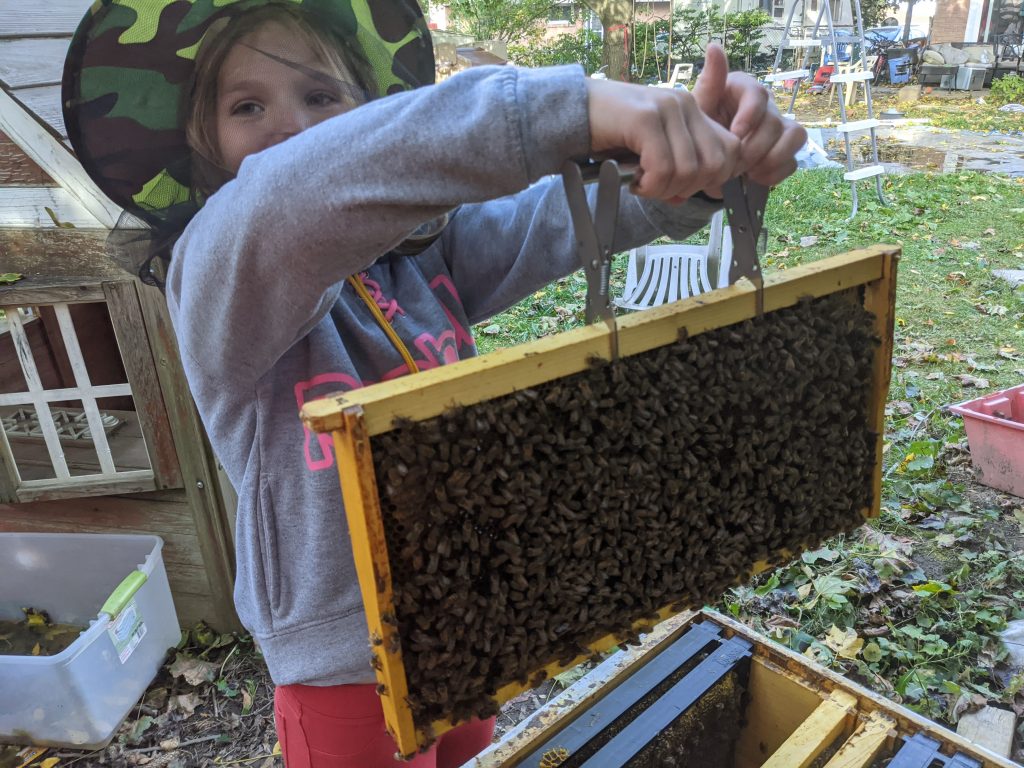
Looking into the brood chamber, they’re starting to build more and more down there. Turns out, our bees don’t really like plastic frames. They much prefer to put honey, and even brood, in the wooden frames up in the supers. But now that the supers are full, they’re starting to store more on the plastic frames simply because they have no other choice – there’s nowhere else to put it. Actually, they’ve started building come between the boxes and storing honey there. Even that seems to be preferred to the plastic, despite it being more work for them.
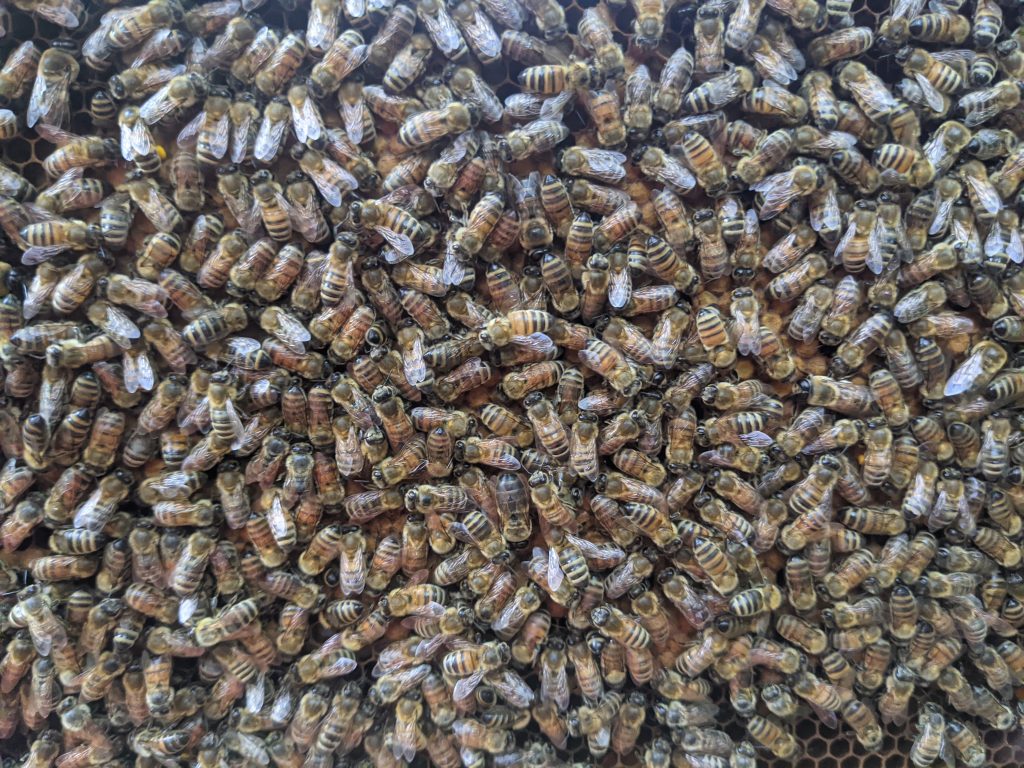
While looking through the hive, we tried to find the queen, but it’s like trying to find a needle in a haystack with so many and I didn’t want the hive open too long. It’s was still a bit cool out, and the bees like to keep the hive a toasty 35C for brood rearing.
Some things we were a bit surprised by:
There are still a lot of drones in the hive. Typically the girls kick all the boys out in the fall to die in the cold. They don’t contribute to the survival of the colony, and only participate in the survival of the species in the spring and summer when they mate with queens. But we still have lots of drones in our hive. Everyone else in the area is saying their drones are being kicked out, so not sure why ours aren’t.
There are still capped brood, which means the queen has been laying in the last week or two at least. I couldn’t manage to see any eggs because there were just so many bees, but there was still capped brood on a couple of frames. They’ll likely be winter bees, which are larger (more fat to help insulate the cluster in the winter), and they live longer to help get through the winter without having to spend resources on rearing brood.
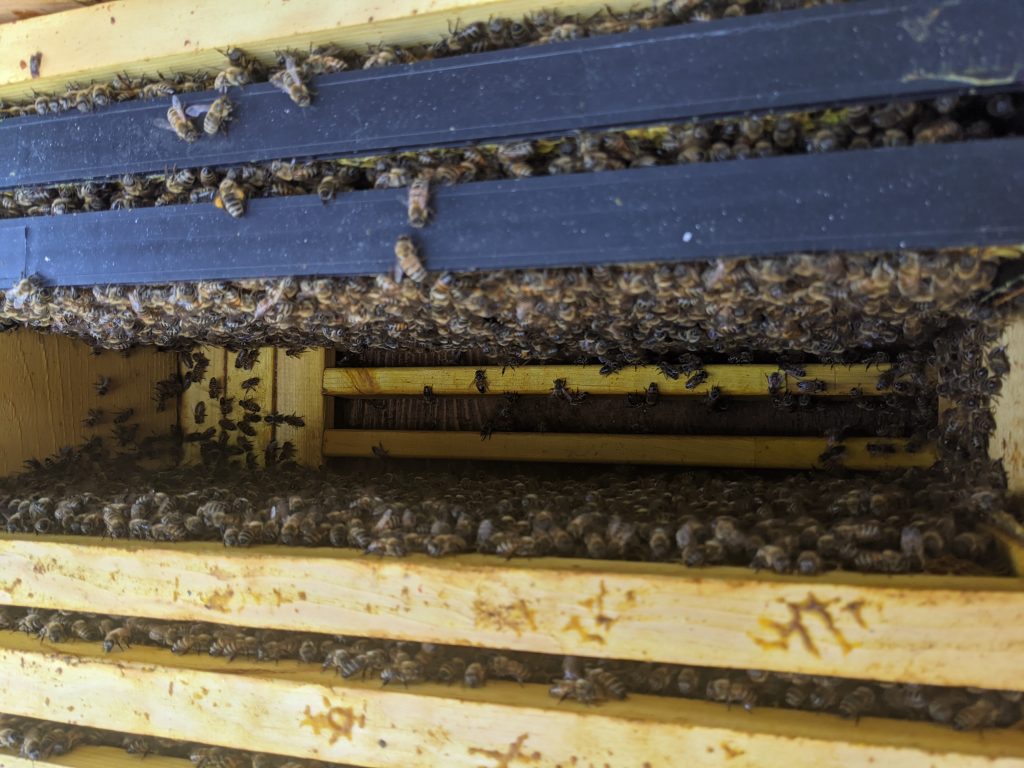
After that, we put it all back together, and I made the entrance of the hive smaller to make it easier for them to defend it.
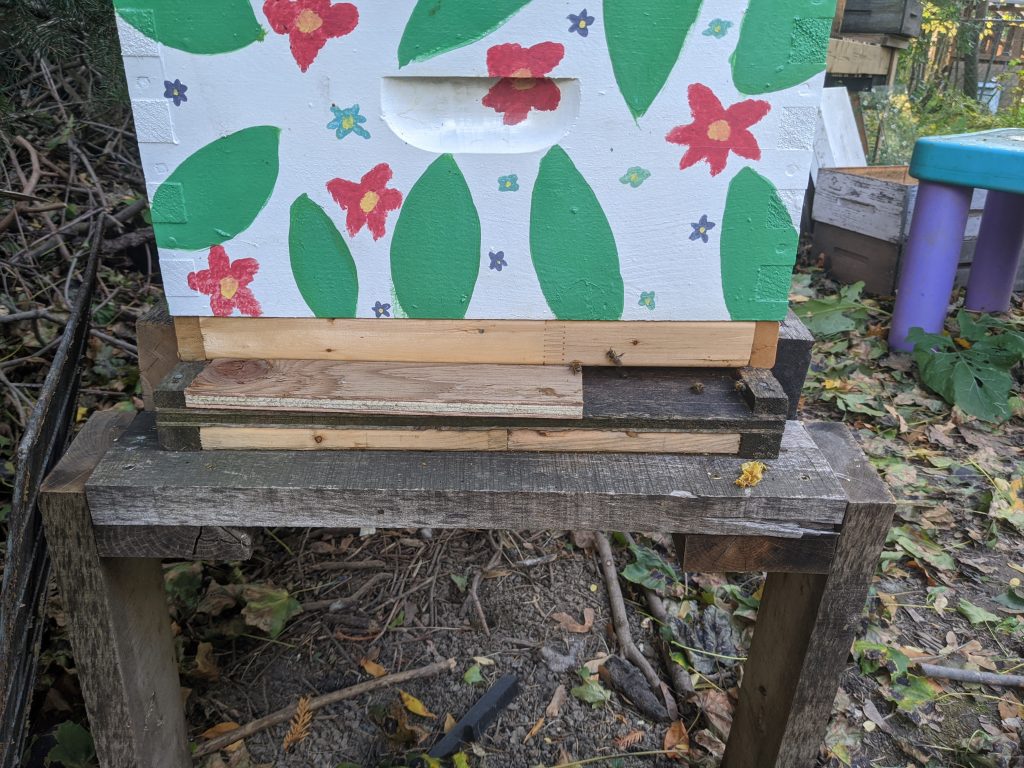
This time of year, the wasps are getting desperate for food as flowers are getting more and more scarce, and they’ll gladly bring all the friends to rob out an entire hive in no time if it’s not strong enough. A smaller entrance is easier to defend, so that should help. I’m not sure if it’s necessary to be honest, because this seems to be a very strong hive. So, we managed to go through the hive without getting stung! That’s three times in a row now. It might be because we’re getting faster – they do seem to get more upset, the longer it’s open.
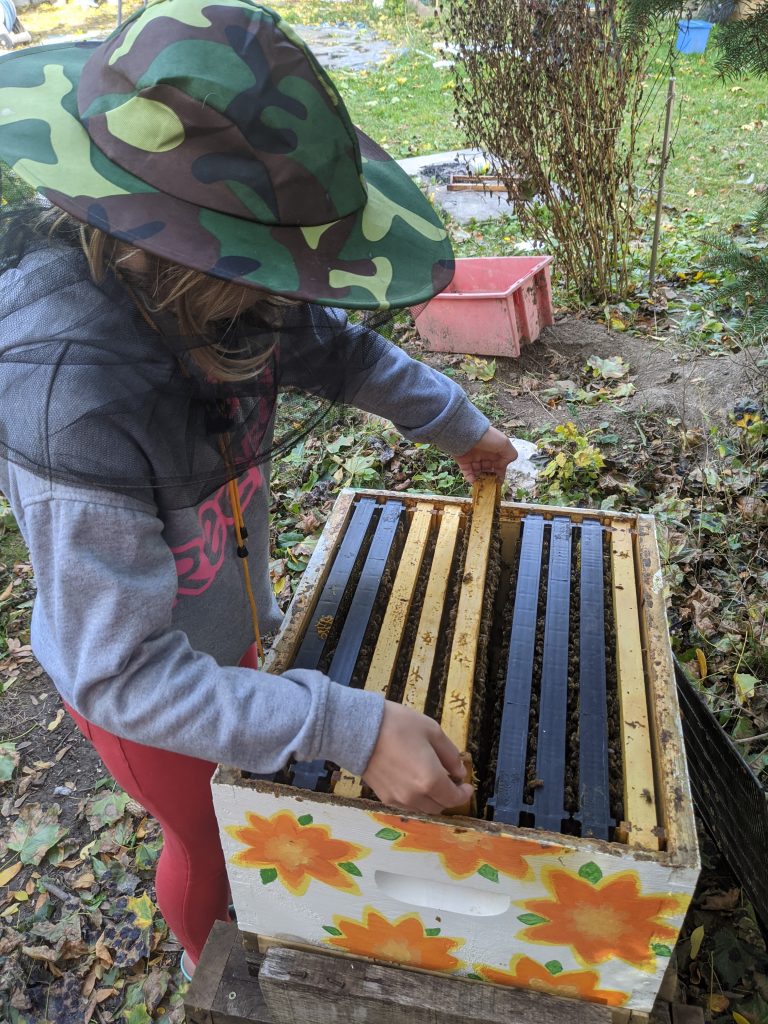
Also, someone suggested I smoke my hands before starting, so I’ve been doing that. It helps mask the smell of “mammal” so they don’t think I’m a bear or something. They don’t like bears.
Lastly, I think we’ve settled on being treatment free beekeepers. This is polarizing topic in the beekeeping community, and it puts me with the minority, by far.
Most (95%+, maybe 99%) beekeepers, especially commercial ones, use a lot of chemicals to treat their bees, to keep away sicknesses, mites, etc.. In theory, they’re not harmful to the bees or to humans, yet a lot of the directions say to make sure you remove the honey before treating…
That’s a bit like saying “no, it’s not bad for you … but hold you’re breath while you use it”. As well, I see a lot of beekeepers who treat and right afterwards, their colony either dies, a lot of the bees die, or the colony leaves – apparently finding that home no longer tolerable (however, they always blame the mites on the colony leaving, not the treatment – timing seems awfully coincidental to me though).
From my perspective, this seems like it might be not as safe as we’re told. But the cultural norm here in North America is to treat, so when you say you aren’t, you get treated pretty poorly by the rest of the community. They call you irresponsible, a “bee-haver, not a beekeeper”, that it’s cruel not to treat them, and all sorts of things.
I’ve also been told that there’s a nearly 100% chance my bees will die this winter due to mites because I’m not treating for mites and if they don’t, it’s just a fluke – they should have died and will next year for sure. I’m not sure how they think bees survive in the wild…
However, in the a small community of treatment-free beekeepers they say they consistently end up with more beehives in the spring than they had going into winter due to spring splits and swarms. Basically their colonies are so healthy and winter so well, they get too big and have to make 1 colony into 2. Or 10 into 20, whereas all I see in the groups that do treat right now is people taking and giving orders for new bees in the spring to replace their anticipated losses. That doesn’t seem to fit the narrative I’ve been told by the majority of beekeepers.
So, I think I’ll take my chances. They might die. They might not. That’s true whether I treat or not it seems. Best case scenario – they survive, and I have bees that have proven they can survive without treatment instead of bees that only live by human intervention. Worst case scenario – they die, we get a bunch of chemical-free honey (because they won’t need it, being dead and all) and I try to catch another swarm in the spring.

